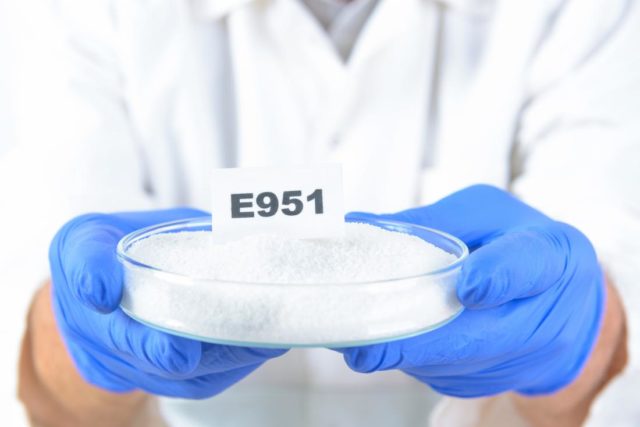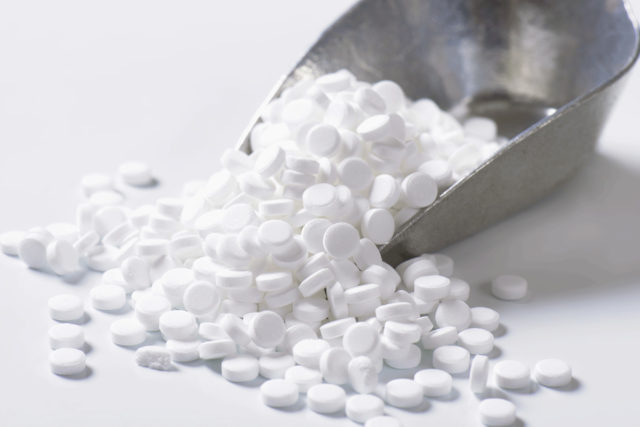Content
- 1 What is the substance aspartame
- 2 Chemical composition of aspartame
- 3 Is aspartame harmful to human health
- 4 Dangerous or not food additive E951 (Aspartame)
- 5 Where is aspartame found
- 6 Calorie content of aspartame
- 7 What can replace aspartame
- 8 Conclusion
- 9 Reviews about the dangers and benefits of aspartame
The harm of aspartame is the most talked about topic for nutritionists. It is an artificial sweetener widely used in the food industry. The scientific name of the substance is additive E951.
What is the substance aspartame
Aspartame is a food additive that adds sweetness to foods. It is an alternative to granulated sugar. The use of sweetened products is encouraged during the period of weight loss. Unlike regular sugar, the additive does not add up to extra pounds. In structure, aspartame resembles methyl alcohol. A distinctive feature of the substance is its sweet taste, which allows you to deceive the receptors.
Food additive E951 is not resistant to even slight temperature increases. Therefore, it is customary to add it to ready-made dishes. The complete destruction of the structure of a substance occurs at temperatures above 80 ° C. When heated, aspartame breaks down into methanol and formaldehyde. Both substances are highly toxic. That is why drinks with a substance content are often written "to consume cold". When heated, they can become a real poison for humans. 1 kg of aspartame gives the same sweetness as 200 kg of regular granulated sugar. Therefore, in production, it is used in minimal dosages.

Outside the composition of the products, the substance has a synthetic neutral taste. When it gets on the receptors, an unpleasant aftertaste is felt for a long time. Aspartame is usually white in color, but it can also be slightly yellowish.
Chemical composition of aspartame
The sugar substitute aspartame was first produced in 1965. The chemical formula of the substance is C14H18N2O5. It includes:
- L-phenylalanine;
- L-Aspartyl.
Is aspartame harmful to human health
There is a lot of controversy about the potential dangers of aspartame. In total, the features of the substance have been closely studied for over 30 years. About 200 scientists have concluded that there is no harmful effect on the body. Despite this, there are opponents of using aspartame in food. In the process of disintegration of a substance in the body, formic acid and methyl alcohol are formed. They are considered the most powerful poisons. However, their number is not enough to have a detrimental effect on health. In addition, these toxins can enter the body and in fruits.
It has been officially proven that a negative effect on the body is excluded only with moderate use of the substance. If it is supplied in excessive quantities, a number of problems can arise. Aspartame is an excitatory neurotransmitter. He is able to provoke disturbances in the work of the brain and increased anxiety. At the same time, there is a gradual depletion of energy reserves.With prolonged use of products with aspartic acid, the structure of blood vessels and capillaries can be disrupted. This provokes the development of certain diseases.
The effect of aspartame on the adult body
An adult's body is considered less susceptible to the negative effects of aspartame. The only contraindication to its use is the presence of phenylketonuria. The disease is hereditary in origin. It is accompanied by a disruption in the production of amino acids, which include phenylalanine. With this disease, a certain diet is prescribed that excludes the sweetener.
To avoid harm from a dietary supplement, the dosage must be followed. It is calculated based on weight. A dose of 2 g of methanol per kg of body weight is considered safe.
Aspartame for children
It is undesirable to give products containing aspartame to children. Toxins can have unpredictable effects on a growing body. Sometimes the substance is added to the composition of medicines. Therefore, it is extremely important to study their composition before giving to a child. E
If your baby eats a product containing aspartame, the following side effects may occur:
- stomach cramps;
- change in gait;
- nausea;
- decreased visual acuity;
- headache.
Aspartame during pregnancy
It is advisable not to use aspartame for pregnant women. Formaldehyde, formed as a result of the breakdown of the substance, is able to penetrate into the child's body. If for an adult he does not pose any danger, then the baby can have a negative impact. With excessive use of products containing aspartame during pregnancy, the risk of developing pathologies in the fetus increases. In addition, there is a risk of premature birth and spontaneous miscarriage.

Aspartame for diabetes
Aspartame is a part of confectionery intended for dietary nutrition. They are often used as an alternative to conventional sweets for diabetes. The benefit of the substance is its low calorie content. This helps prevent weight gain. On the other hand, aspartame makes it difficult to diagnose glucose, which is extremely dangerous in diabetes mellitus. In addition, regular intake of the substance in the body increases the likelihood of developing retinopathy.
Dangerous or not food additive E951 (Aspartame)
According to official data, the use of sugar substitutes in food does not harm human health. But in practice, there is a risk of developing adverse reactions. They are provoked by an excessive intake of a substance into the body. In this case, there is a violation of the metabolism of hormones with the ensuing problems.
Possible side effects of aspartame include:
- oppression of reproductive function;
- disruption of the liver and kidneys;
- circulatory pathology;
- deterioration of vision;
- sleep disturbance;
- skin rashes.
It should be borne in mind that the sweetener has a much stronger effect on receptors. Soda with aspartame will not satisfy your thirst. On the contrary, it enhances it. Confectionery with its content does not contribute to the production of serotonin. This leads to the fact that a person cannot fill the need for sweets. On this basis, he increases the amount of food consumed.
Before being released on the international market, each product undergoes a series of tests. To determine the level of aspartame, chromatographic and spectrophotometric research methods are used. Based on the results of the analysis of the composition of the substance, a certificate of conformity is issued, allowing the use of the product in the food and pharmaceutical industries.
Where is aspartame found
Aspartame is widely used in the confectionery industry. It increases the target audience, allowing sweets to be consumed, even by those who cannot. It is included in all dietary and low-calorie foods.Sometimes it is added to medicines as well. The substance can be found in the following foods:
- carbonated drinks and various cocktails;
- ice cream;
- confectionery;
- Toothpaste;
- children food;
- medications.
Calorie content of aspartame
Aspartame adds sweetness to the dish, but does not make it high in calories. 100 g of the substance contains 365 kcal. But a minimum amount of additive is required to impart a sweet taste. Therefore, the calorie content as a result increases slightly.
What can replace aspartame
To eliminate the possibility of side effects, you can replace the sweetener with more natural alternatives. These include sweeteners based on stevia and erythritol. The food supplements contain environmentally friendly ingredients that do not have a detrimental effect on health. They do not contain carbohydrates and do not contribute to weight gain. In addition, they can be used by children, pregnant and lactating women.
Conclusion
The harm of aspartame is possible only with excessive intake of the substance into the body. When consumed in moderation, the sweetener does not have a systemic effect on health. Therefore, it is important to respect the recommended dosages.

